The Church of Scotland 'trajectory' rejects God
Following the Church of Scotland's vote in the May 2011 General Assembly there has not been much tangible sign of any reaction. But a meeting on a wet day in Glasgow last week broke the silence.
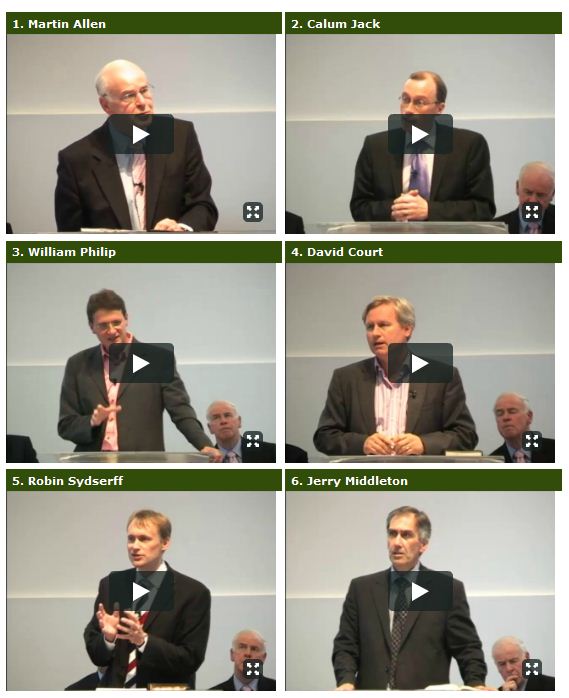 UPDATE: Video recordings of the six speakers on the day are now available. Click here. UPDATE: Video recordings of the six speakers on the day are now available. Click here.Preamble: The gathering referred to below was essentially a private meeting for ministers and elders in the Church of Scotland and principally (but by no means exclusively) concerns those within the Church of Scotland and the wider Presbyterian world.
There were six speakers (all ministers) but no names have been included; nor does the report contain any photographs of those present: the exception is the interview with Rev. Ian Watson who spoke to camera for a TV news report. Since the report was written recordings of the meeting have been made public
-------------------------------------------------------
St. Georges-Tron Church of Scotland
 If the Church of Scotland is struggling with God, then Friday, 17 June, 2011 saw a large meeting of its evangelical churchmen which could become a huge coffin nail for the once-mighty national church whose spiritual condition is now viewed as being in terminal decline. If the Church of Scotland is struggling with God, then Friday, 17 June, 2011 saw a large meeting of its evangelical churchmen which could become a huge coffin nail for the once-mighty national church whose spiritual condition is now viewed as being in terminal decline.
The gathering was instigated in an Edinburgh coffee shop two days after the denomination – meeting in annual General Assembly – voted to permit practicing homosexuals to serve as ministers within its national network of parish churches.
And so it was, less than four weeks after that fateful decision, that the first collective and large-scale meeting was held. The impressive building of St. George’s-Tron church sits on the main shopping thoroughfare of Buchanan Street in Glasgow. Within its walls, over 650 mainly-male voices of ministers and elders from the ‘the Kirk’, sang with great gusto while contemplating an unforeseeable future; a future perhaps within, but more likely outside of Scotland’s principal, oldest and largest and Reformed denomination.
On an overcast afternoon – punctuated by rain and staring the disastrous Assembly outcome in the face – the volume of singing to God’s praise threatened to lift the roof of the newly-refurbished building. It was a defiant post-Assembly ‘shout’; an expression of undiminished, or even amplified evangelical fervour.
A history of turmoil
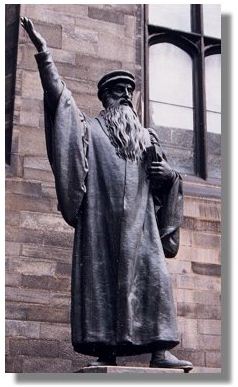 As an institution, the Church of Scotland dates back to the 16th century when the Reformation of Luther and Calvin swept through the nation – impelled by the fiery preaching of John Knox and his followers. Though rent and racked since those formative years by many divisions, it has managed to survive successive splits, schisms and reunion: at least until now. (The body politic is expert in its bureaucratic manoeuvrings to defuse any threat to the cohesion of the institution.) As an institution, the Church of Scotland dates back to the 16th century when the Reformation of Luther and Calvin swept through the nation – impelled by the fiery preaching of John Knox and his followers. Though rent and racked since those formative years by many divisions, it has managed to survive successive splits, schisms and reunion: at least until now. (The body politic is expert in its bureaucratic manoeuvrings to defuse any threat to the cohesion of the institution.)
But the events during the General Assembly of last month have provoked arguably the worst crisis since 1843 when the first major split took place over the issue of patronage and the relationship between church and state. At that time the ‘Disruption’ saw a third of the church – ministers, elders and members – leave in concerted and choreographed fashion as a cohesive, if not unanimous response to the concerns of that day.
A different dynamic; but a line has been crossed
This time however it has been different. Though the same passion is evident, the response has been of a quite different order. Though much lower in profile – at this stage anyway – the consequences in the longer term may be even more significant; much more significant. In the 19th century a parallel denomination was formed. In 2011 much more is needed; but not, emphatically not, more of the same. There are a variety of options and each minister, congregation and member is now deciding on respective courses of action.
While the individual responses – at personal and congregational level – are and will be varied, the overarching message from the six ministers who spoke on the day was and is essentially the same. To a man they affirmed that the denomination in which they have served has reached a defining moment. A line has been crossed; a watershed has been reached; a new day has dawned and a new terrain lies ahead. In the listening it would have been difficult to disagree.
One parish minister has written in his Summer congregational newsletter:
“Don’t be fooled by the official [Church of Scotland] line that nothing his yet been decided. The decisions taken at the Assembly represented a clear and deliberate shift away from the authority of Scripture as the Word of God and the foundation of our denomination.”
The opening sermonette at ‘the Tron’ was based on Jesus’ high-priestly prayer found in the Gospel of John (Chapter 17). The theme being unity; that is a unity within evangelical ranks based – as only true unity can be – on God’s Truth.
Differing views
It was however acknowledged at the outset that there are, perhaps surprisingly, two quite different assessments of the situation even amongst evangelical ranks. Some, it was said, see no major significance; at congregational level it is ‘business as usual’.
But most would overtly or privately acknowledge the view expressed in the aforementioned parish magazine that that Church has deliberately and with planned resolve departed from the clear teachings of the Bible and the authority of God. Certainly this was the view of every platform speaker. To use the biblical expressions, the Church is now judged by them as being apostate (in open rebellion and unbelief) and, employing one description on the day, a spiritual corpse.
A slow demise
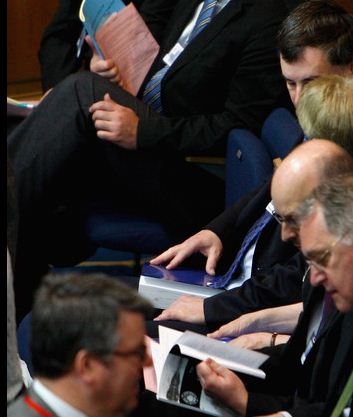 A theological study on the new order has been commissioned to report in two years time. However, only the most optimistic (some might say ‘self-deluded’) would anticipate a reversal of the ‘revisionist trajectory’ which the Church has fixedly set itself upon. A theological study on the new order has been commissioned to report in two years time. However, only the most optimistic (some might say ‘self-deluded’) would anticipate a reversal of the ‘revisionist trajectory’ which the Church has fixedly set itself upon.
One speaker rhetorically asked: “Is there any evidence that the General Assembly of 2013 will be swayed by biblical truth?” His pragmatic answer? “I see none.”
Reference was made to an Assembly Commissioner who affirmed: “We know better than the Bible.” That statement, made on the floor of the May gathering and in the eyes and ears of the watching evangelical world, put it in a nutshell.
Accordingly those who are thinking of adopting a ‘wait and see’ attitude were invited last Friday to think what they will do in two years time if, as expected, the Church continues on the path it has chosen.
[It is important to note that a cohort of the liberally-minded elite in the denomination worked assiduously, but ultimately unsuccessfully, for a General Assembly non-decision on the whole issue in order to pre-empt the prospect of denominational fracture. |

"We know better
than the Bible"
|
It is also instructional to note that from an evangelical standpoint the May gathering on Edinburgh’s Mound was “the ‘most prepared-for and most prayed-for’ General Assembly in the last 100 years”. In this context neither the liberals nor the evangelicals got the answer they were looking for. The answer nevertheless was crystal clear: apostasy is the direction of travel.]
A reality revealed
To say that there is a split is stating the obvious. As one speaker put it: “Separation would just be expressing a reality that is already there.” So even supposing that not a single member or congregation left, the denomination has clearly departed from the ‘faith first entrusted to the saints’ and accordingly, anyone and everyone within the institution is now effectively operating in an environment which is hostile to God and in open defiance of His Word.
In the true and biblical meaning of the term, the Church of Scotland can no longer be described as a Christian church. And this, for the sake of the nation and God’s Holy Name, is a tragedy.
A leap into the unknown
|
"I said to the man who stood at the Gate of the Year,
‘Give me a light that I may tread safely into the unknown.’
And he replied, ‘Go out into the darkness, and put your hand into the Hand of God.
That shall be better than light, and safer than a known way.’"
|
According to the Bible, ‘faith is being sure of what we hope for and certain of what we do not see’. But ‘Trust’ is subtly different, and could be defined as ‘faith in action’.
Now faith is being sure of what we hope for and certain of what we do not see.
This is what the ancients were commended for. Heb.11:1-2 |
'Trust' is
faith
in action
|
For ministers who have preached faith with fervour over the years, a day of great testing has arrived. Every speaker at the Glasgow meeting affirmed that action is essential; yet it was acknowledged on the day that self-interest and personal security can often be powerful incentives to maintaining the status quo.
Aside from the daily stresses (though few in the everyday workplace are immune from these), one of the most secure jobs to be had, is that of a Church of Scotland minister. It was hardly then surprising that more than one speaker admitted to apprehension and even fear when contemplating a life outside of the great big machine. Institutionalisation is not confined to long-term prisoners, and unpalatable surroundings can often be more attractive than the scary world outside. Some ministers have gone for school, to university and into the ministry, and thus have no experience of 'life outside' of these environments.
Please pray for all these men that they will be able to 'hold fast' in the storm. Our security is in God's character and His promises – including those for our personal lives and families. But there are times when these truths are substatially in abstract, and other times when they come into sharp focus.
Faith and Trust
 The story is told of the French trapeze artiste Charles Blondin. His greatest fame came in June of 1859 when he attempted to become the first person to cross a tightrope stretched over a quarter of a mile across the mighty Niagara Falls. The story is told of the French trapeze artiste Charles Blondin. His greatest fame came in June of 1859 when he attempted to become the first person to cross a tightrope stretched over a quarter of a mile across the mighty Niagara Falls.
A large crowd gathered and a buzz of excitement ran along both sides of the river bank. They gasped in amazement as Blondin carefully walked across; one dangerous step after another; blindfolded and pushing a wheelbarrow.
Upon reaching the opposite side, the crowd's applause was louder than the roar of the falls. In the face of the wild acclaim Blondin suddenly stopped and addressed his enthralled audience: "Do you have faith to believe I can carry a person across in this wheelbarrow?"The crowd enthusiastically shouted an affirmative. "Right," said Blondin in response to that show of confidence, "Get in the wheelbarrow....."
As the story goes, no one did! But there again perhaps no one in that gathering preached faith and trust Sunday by Sunday.
Out of the box

"I feel that I have been set free"
|
Yet there is at least one minister, not long with his present congregation, is prepared to make the big break. When asked by a concerned friend how he was feeling the day following the Glasgow meeting, he replied: “I feel I have been set free.” He said that he felt that a great weight had been lifted from his shoulders.
But for you who revere my name, the sun of righteousness will rise with healing in its wings. And you will go out and leap like calves released from the stall. (Mal. 4:2) |
In a further positive acknowledgement of a ‘new day’ ahead, the preacher with the heart of an evangelist added: “I don’t care if I have to drive a lorry [ in order to support myself and my family in my ministry]”. A good man with a good attitude.
If that minister’s readiness to contemplate a complete paradigm shift in his thinking and personal situation is typical across the evangelical spectrum, then there is great hope for tomorrow.
The same however cannot be said for the Church of Scotland.
An Edinburgh congregation has already made up its mind as finding itself unable to:
- submit to the General Assembly decision on same-sex relationships
- contribute funds to the denomination
- accept oversight by the presbytery (local geographical grouping of churches)
- participate in regular church courts and committes locally and nationally
It will be interesting to see how the instituation responds (or not) to this scenario.
And out of the camp
 Let us, then, go to him outside the camp, bearing the disgrace he bore. For here we do not have an enduring city, but we are looking for the city that is to come. Heb 13:13-14 Let us, then, go to him outside the camp, bearing the disgrace he bore. For here we do not have an enduring city, but we are looking for the city that is to come. Heb 13:13-14
'Out of the camp’ was the only option for Moses when faced with a situation of spiritual dereliction; and departure is perhaps the only honest-to-God recourse in the present situation. It will be spiritually dangerous to stay. (The principle of the mutual influence of the ‘clean’ and the ‘unclean’ was expressed by the prophet Haggai (Haggai 2:12 - 13). In spiritual matters the ‘clean’ is invariably the loser.)
In a chilling follow-through, the prophet declares the mind of God where sin is involved: "So it is with this people and this nation in my sight,' declares the Lord. 'Whatever they do and whatever they offer there is defiled.'" (Haggai 2:14)
The Church has made its agenda clear: the body is set on its chosen trajectory.
As one minister put it: “The Church of Scotland has now publicly committed itself to be unholy, uncatholic and unapostolic.” In acknowledging both the need for and the risk of radical action he said: “I would rather put my head above the parapet than simply stick it in the sand.” |

“I would rather put my head above the parapet than simply stick it in the sand.”
|
Terminal trends
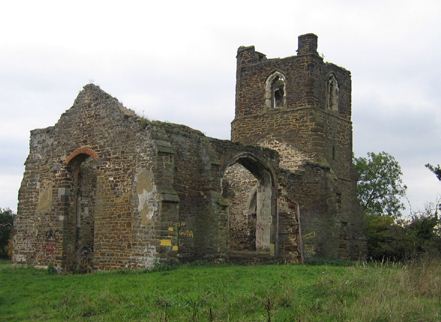 Aside from the spiritual decline in the Church, a secular analysis regarding the denomination’s health and life expectancy comes up with the same answer. Aside from the spiritual decline in the Church, a secular analysis regarding the denomination’s health and life expectancy comes up with the same answer.
The organisation is already in numerical, demographic and financial meltdown. Faced with increasing liabilities, grossly-reduced income from disaffected evangelicals; retiring ministers; expensive buildings; ageing congregations and a liberal membership which is comparatively illiberal in its financial givings, the prospects are not good.
(As an aside, when splits occur, there is usually a fight over possession of buildings. However many of these could represent heavyweight liabilities which neither side of a separating body might necessarily want to hold on to.)
But spiritual life beyond..
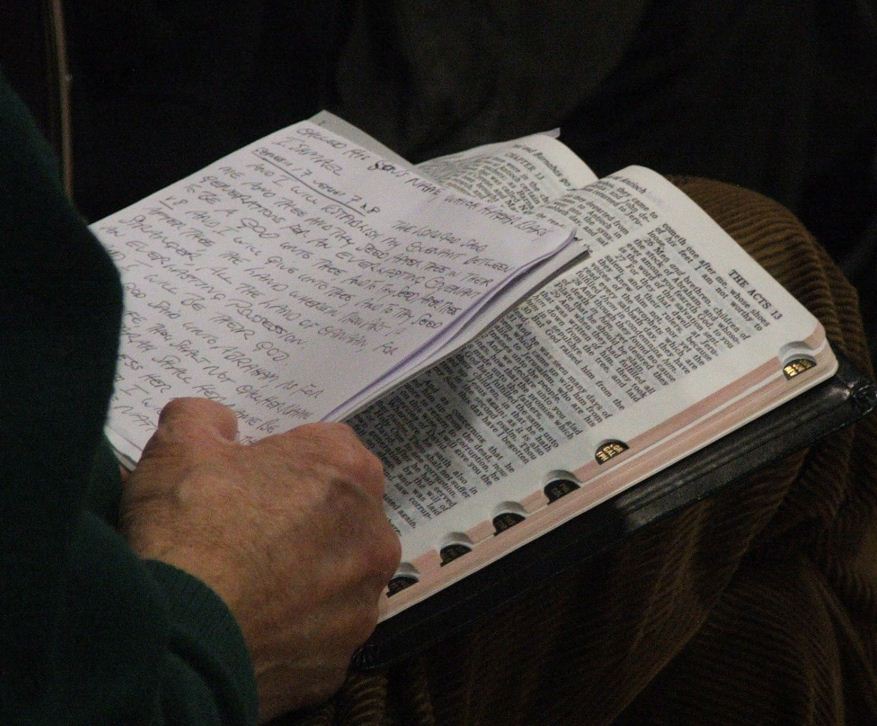 In our 21st century nation, it is not just the Church of Scotland which is in crisis. There are profound and chronic problems right across the denominational spectrum; and these issues are causing all those who have any respect for the Word of God to ‘get back to basics’. In our 21st century nation, it is not just the Church of Scotland which is in crisis. There are profound and chronic problems right across the denominational spectrum; and these issues are causing all those who have any respect for the Word of God to ‘get back to basics’.
So what all of this might produce is a re-energised and faithful remnant of Bible-believers who will proclaim and live out the true Gospel of Truth and trust in Jesus Christ – to the glory of God and the saving of souls. This is the heart of the Great Commission. It is a calling to and the responsibility of every follower of Jesus Christ. A nation deserves nothing less; our nation needs nothing more.
Sorry, your browser is unable to play this type of file.
You can still download it
|
Since the above report was prepared, video recordings of the six speakers have become available. These are now available below.
COMING SOON: Recorded interviews with Rev. David J. Randall and Rev. Louis Kinsey
Footnotes:
St. John's Shaunessey, Vancouver
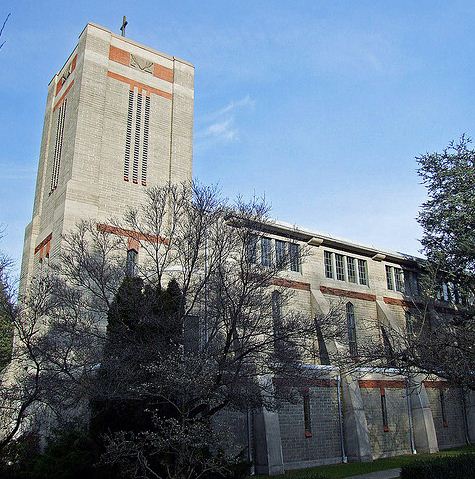 At the meeting in Glasgow one speaker showed a recent video interview with the highly-respected Rev. Dr. J.I Packer who is on staff at St. John's Shaunessey (the largest Anglican Church in Canada). At the meeting in Glasgow one speaker showed a recent video interview with the highly-respected Rev. Dr. J.I Packer who is on staff at St. John's Shaunessey (the largest Anglican Church in Canada).
Back in 1966 there was a huge controversy in England when, concerned about evangelical compromise, Dr. Martyn Lloyd-Jones called on believers to leave their denominations.
Rev. Dr. John Stott who was chairing the meeting immediately took the platform to publicly disagree with his evangelical colleague. The record states that Packer aligned himself with Stott on that occasion and urged believers to stay where they were.
In the video interview shown in Glasgow last week, Packer stated that while some matters were 'secondary' the issue of sexuality is primary. In this context the theologian and the rest of the congregation of St. John's have removed themselves from the authority of the Anglican Church in Canada.
The day before meeting in Glasgow, St. John's were refused a right of appeal over the removal of ownership of their building. On Thursday, 23 June the congregation met in a gym to discuss the 'transition'.
Further analysis: It is hoped to offer further thoughts from Scripture on the implications of the above report in terms of the estimated impact on the structure, leadership and membership of the Church of Scotland (for those who stay and those who go).
|